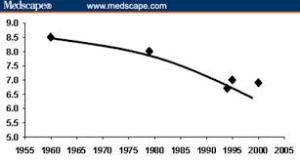Obesity, and diabetes are now reaching epidemic proportions in prevalence. Here’s a look at why:
The Obesity Epidemic Started When The Low-Fat Guidelines Were Published
Source: National Center for Health Statistics (US). Health, United States, 2008: With Special Feature on the Health of Young Adults. 2009 Mar. Chartbook.

In the 20th century, scientists believed fat, especially saturated fat, to be the main dietary cause of heart disease (although this has since been disproven).
This led to the birth of the low-fat diet. Interestingly, the obesity epidemic started at almost the exact same time the low-fat guidelines first came out.
There are massive long-term studies showing that the low-fat diet does NOT cause weight loss, and does not prevent heart disease or cancer.
We Are Drinking More Sugary Soda and Fruit Juices

The brain doesn’t “register” liquid sugar calories in the same way as it does solid calories. So if we consume a sugary drink, the brain doesn’t automatically make you eat fewer calories of something else instead.
Studies have shown that a single daily serving of a sugar-sweetened beverage, including natural juices, is linked to a 60.1% increased risk of obesity in children.
Sugar is bad… but sugar in liquid form is even worse.
We Have Become Sedentary

Although leisure time physical activity (exercise) has increased, it is also true that people now have jobs that are less physically demanding.
We are now burning around 100 fewer calories per day in our jobs, which may contribute to weight gain over time.
We Are Eating More Vegetable Oils, Mostly From Processed Foods

Processed foods contain trans fats, inflammation-causing refined oils, sugar, preservatives, flavor enhancers, artificial flavors, coloring agents and a host of other chemicals to increase the shelf life or appeal of these artificial foods, increasing their addictive nature.
The vegetable oils we use in our home, irrespective of original source, goes through intense heat and chemical processes, stripping it of all benefits. Colors and flavors are then added to make them appealing.
All these are harmful in various ways.
We Are Sleeping Less
Source: Cauter EV, et al. The Impact of Sleep Deprivation on Hormones and Metabolism. Medscape, 2005.

In recent decades, average sleep duration has decreased by 1-2 hours per night. The reasons for this are numerous, but increased artificial lighting and electronics are likely contributors.
As it turns out, short sleep duration is one of the strongest individual risk factors for obesity. It is linked to an 89% increased risk in children, and a 55% increased risk in adults.
Increased Calorie Intake

Calorie consumption has increased dramatically over the past few decades.
But it’s important to keep in mind that it is not some collective moral failure that drives the increased calorie intake. Xenobiotics from toxins such as from plastics and heavy metals disrupt our hormones, altering the way our brains and bodies work.
This is the underlying reason for the increased calorie intake and weight gain, NOT a lack of willpower, as some people would have us believe.
Now that we know, we can easily take steps to Remain Healthy.















